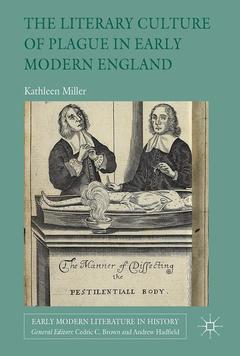Description
The Literary Culture of Plague in Early Modern England, 1st ed. 2016
Early Modern Literature in History Series
Author: Miller Kathleen
Language: English
Subjects for The Literary Culture of Plague in Early Modern England:
Publication date: 07-2017
Support: Print on demand
Support: Print on demand
Description
/li>Contents
/li>Biography
/li>Comment
/li>
This book is about the literary culture that emerged during and in the aftermath of the Great Plague of London (1665). Textual transmission impacted upon and simultaneously was impacted by the events of the plague. This book examines the role of print and manuscript cultures on representations of the disease through micro-histories and case studies of writing from that time, interpreting the place of these media and the construction of authorship during the outbreak. The macabre history of plague in early modern England largely ended with the Great Plague of London, and the miscellany of plague writings that responded to the epidemic forms the subject of this book.
1. Introduction.- 2. Continuities in Plague Writing.- 3. Medical Debates on Plague.- 4. Plague and Nonconformity.- 5. Katharine Austen's Reckoning with Plague in Book M.- 6. Pestilence and War.- 7. Pestilential Poesies.- 8. Conclusion: Recalling the Plague of 1665 in Later Literary Culture.- Bibliography.- Index.-
Kathleen Miller is Visiting Research Fellow at Queen’s University Belfast, UK. She completed her PhD at Trinity College Dublin, receiving a four-year PRTLI Trinity Long Room Hub Scholarship. She has worked as an adjunct lecturer at the National University of Ireland, Galway, lecturing on the body in Renaissance literature.
Examines the literary culture/history of one of the most virulent, deadly, and certainly best-known plagues ever to hit London Touches on aspects and methodologies from book history, manuscript and print culture, as well as Early Modern medical culture Draws on a wide variety of source material, from canonical works to medical records
© 2024 LAVOISIER S.A.S.

